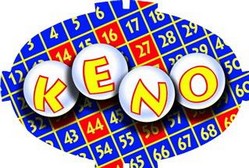 Keno is a game that enjoyed great popularity in Nevada casinos in the mid-twentieth century. Its use is now waning, as serious players realize that it does not offer a good expected return. Casinos also realize that it requires much labor and also considerable security to ensure that all play is honest. The game that is now played can be traced back to Chinese games two millennia ago. The Chinese used boards with ninety (or more) characters. They brought the game to the United States as they emigrated to the West Coast for jobs on the railroads and in the mines.
Keno is a game that enjoyed great popularity in Nevada casinos in the mid-twentieth century. Its use is now waning, as serious players realize that it does not offer a good expected return. Casinos also realize that it requires much labor and also considerable security to ensure that all play is honest. The game that is now played can be traced back to Chinese games two millennia ago. The Chinese used boards with ninety (or more) characters. They brought the game to the United States as they emigrated to the West Coast for jobs on the railroads and in the mines.
Americans modified the game so that numbers replaced characters. When casinos reopened in Nevada in the 1930s, an 80-number game became standard, and it is still in use. The player is given a sheet of paper with ten columns and eight rows of numbers. He or she may bet on from 1 to 15 numbers. Numbered balls (or a computer number generator) are then retrieved from a randomizer, and 20 numbers are called. Hence, for a one-number pick, there is a one in four chance to have it called. The payoff is even money. In addition to picking one set of numbers (up to 15 of them), the player may use his card for making several combination bets. After marking the card, the player gives it to a casino official (or keno runner) who verifies it and gives him a receipt.
The convenient feature of keno in a casino is that players can wager and play the game while dining, watching entertainers, or playing other games. The winning numbers are posted on boards throughout the casino facility. Games are separated by fifteen or twenty minutes, and winners usually have several hours to turn in cards for payoffs. The house edge is determined by payoff schedules. Typical Nevada payoffs to players range from about 75 percent to about 65 percent (a house edge of 35 percent) depending upon how many numbers are bet. When more than three numbers are bet, there are prizes for having some of the numbers (but not all) called.
Although the game is considered by most experts to be a “sucker’s bet”, many persons like the fantasy of being able to play a one-dollar game and win $25,000 or $50,000 for hitting fourteen of fifteen numbers. The casino, however, guards itself from extraordinary risks by limiting all prizes on a game to an arbitrary figure, such as $50,000. If there are multiple big winners on the game, they have to divide the prize.
|
|